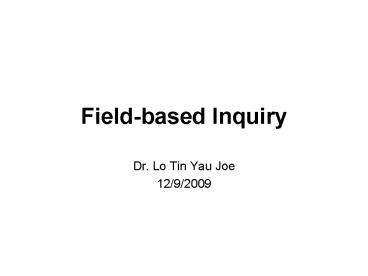Fieldbased Inquiry - PowerPoint PPT Presentation
1 / 17
Title:
Fieldbased Inquiry
Description:
2. Inquiry a strategy/process. observation raising questions making ... curriculum-connected? educative rubrics? learning in action through reflections? ... – PowerPoint PPT presentation
Number of Views:20
Avg rating:3.0/5.0
Title: Fieldbased Inquiry
1
Field-based Inquiry
- Dr. Lo Tin Yau Joe
- 12/9/2009
2
1. Inquiry - meanings
- answering questions ?
- exploring causes and solving problems ?
- confronting issues ?
- clarifying values?
- constructing/reconstructing concepts?
3
2. Inquiry a strategy/process
- observation? raising questions? making
predictions? testing hypotheses? creating
theories and conceptual models - other alternative pathways?
4
3. Model of social inquiry
Doubt-concern
Problem formulation
Formulation of hypotheses
Theory - values
Definition of terms - Conceptualization
Collection of data
Evaluation and analysis of data
Testing hypotheses Driving generalizations and
theories
Beginning inquiry anew
5
4. Planning and designing
- reference to the curriculum guide/ unit or lesson
plan (connectivity/curriculum fit) - backward mapping learning outcomes (concepts?
skills? values?) - what to teach and learn? how to teach and learn?
how to assess?
6
5. Inquiry in LS
- knowledge is socially constructed and mediated
(conceptual changes) - connectivity space, time , spacetime
- perspective consciousness?
- perspective transformation
- values clarifications/conflict resolutions
7
6. Inquiry instruments/methods
- textual multi-text
- dialogic questioning?
- social
- scientific
8
7. Bedrock
- challenging assumptions
- problematizing the unproblematic
- seeing old issue in new frame and context
- knowledge is tentativesubject to contextual and
temporal changes
9
8. Pre-trip
- prior knowledge/concepts and skills of students
- designs inquiry issues/research agenda,
instruments/methods, activities/learning/assessmen
t tasks, expected learning outcomes, assessment
rubrics, extension activities - data to be collected (multiple sources)
- group? individual?
10
8. Pre-trip (cont)
- part to whole
- formal and informal curricula inter-linkage
- background information/resources
- pre-trip briefing session(s) and/or workshops (if
necessary)
11
9. In the field
- overview? specific
- group work one site multiple tasks or
multiple sites one task - inter-exhibit/inter-site connectivity
- inquiry process and context interdisciplinary?
- interactive people and objects people and
people
12
9. In the field (cont)
- time on tasks
- observational? descriptive? explanatory?
affective? exploratory? comparative? - diverse abilities and responses (unintended
outcomes?) - teachers observation and field notes for
debriefing
13
10. Post-trip
- data interpretation and analysis (triangulation)
distinguishing facts from opinions - oral presentations (jigsawing) and peer reviews
for improvement - deficiencies and remedies
- written or non-written reports
14
10. Post-trip (cont)
- self-reflection and meta-cognition
- feedback for assessment
- re-conceptualization
- extension activities?
15
11. Some problems and issues to be addressed
- peripheral contentsgt core/key concepts
- discrete contents/facts gt learning experiences
- inquiry questions ? fact finding? (frame of
reference? scope/sequence? flow?) - worksheets - connectivity
- isolated/orphan skills
16
11. Some problems and issues to be addressed
(cont)
- level of difficulties low? high?
- transferability of knowledge through application?
- repetitionsgt variations (levels of progression)
- cognitivegt non-cognitive (social,
contextual/physical, affective, behavioural) - technology-assisted?
17
- data interpretations gt data analysis
(triangulation)? - evidence-based ?
- curriculum-connected?
- educative rubrics?
- learning in action through reflections?






























![⚡Read✔[PDF] Engaging in Narrative Inquiries with Children and Youth (Developing PowerPoint PPT Presentation](https://s3.amazonaws.com/images.powershow.com/10051151.th0.jpg?_=202406081010)
